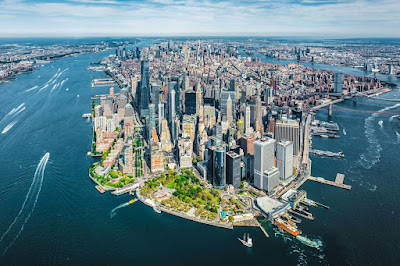America's Financial Hotspots: Ranking the Top Cities.
What makes a city financially thriving?
Our ranking reveals some surprising and interesting findings about which cities are leading the way in financial thriving and which ones are falling behind. Let's go.
1. NEW YORK
But what makes New York so successful and attractive in the global financial landscape?
A look at the state's economy and history reveals some of the reasons behind its remarkable performance.
New York has the third-largest economy in the U.S. and the twelfth largest in the world, with a gross state product (GSP) of $2.0 trillion in 2022-Q2.
Its economy is diverse and dynamic, driven by six major industries: financial services, healthcare, professional and business services, retail trade, manufacturing, and education.
The financial services sector is the largest and most influential industry in New York, generating $429 billion for the state's GSP in 2020.
It is home to the New York Stock Exchange (NYSE), the world's most influential securities exchange, as well as hundreds of banks, hedge funds, insurance companies, and fintech firms.
New York's financial history dates back to the colonial era, when it was a major trading port for goods such as fur, wheat, and tobacco.
It also hosted the first public securities auction in 1792, which led to the creation of the Buttonwood Agreement, a precursor to the NYSE (New York Stock Exhange).
2. SAN FRANCISCO
San Francisco is among top 5 financial cities in America, It ranks fifth globally and second nationally in the GFCI, behind New York.
But what makes San Francisco so successful and attractive in the American financial landscape?This city has shown resilience and adaptability in facing various challenges such as earthquakes,fires,recessions,and pandemics.
3. BOSTON
Boston, located in Massachusetts, is more than just the state's capital and largest city – it's also the cultural and financial hub of the New England region.
With a diverse population, a rich history, and a reputation for innovation, Boston is one of the top leaders in education, healthcare, biotechnology, and finance.
As of 2020, Boston had a population of about 676,000 people, making it the 24th most populous city in the United States.
The greater metropolitan area, known as Greater Boston, is home to over 4.9 million people and is the 10th largest metro area in the country.
Founded in 1630, Boston has played an important role in many historical events, including the American Revolution, the abolitionist movement, the Industrial Revolution, and the development of American democracy.
Today, the city is home to some of the most prestigious universities and colleges in the world, including Harvard University, Massachusetts Institute of Technology (MIT), Boston University, Boston College, Northeastern University, and Tufts University.
These institutions attract thousands of students, researchers, and entrepreneurs from around the world, creating a diverse intellectual community.
The city is a major financial center, with a strong presence in banking, insurance, asset management, venture capital, private equity, and fintech.
Boston is home to the Boston Stock Exchange (BSE), one of the oldest stock exchanges in America, which offers trading in stocks and options on various platforms.
In addition to its impressive professional and financial credentials, Boston offers a vibrant cultural scene and a range of attractions and activities for both residents and visitors.
Overall, Boston is a dynamic and prosperous city that offers numerous opportunities for finance professionals and enthusiasts.
4. CHICAGO
Chicago, the largest city in the Midwest region and the third-largest city in the United States, is an attractive destination for businesspeople who want to do business in America.
With a strong and diversified economy, the city is a major center of commerce, industry, transportation, and culture.
It is also a significant financial hub, with a diverse and dynamic financial sector that serves the local, national, and global markets.
The city hosts two of the leading futures exchanges in the world: the Chicago Mercantile Exchange (CME) and the Chicago Board of Trade (CBOT).
The city also has a strong presence of banking, insurance, asset management, hedge fund, private equity, and fintech firms.
Some of the largest financial institutions based or operating in Chicago include JPMorgan Chase, Bank of America, Northern Trust Corporation, Allstate Corporation, CNA Financial Corporation, Morningstar Inc., Guggenheim Partners LLC., Citadel LLC., and Discover Financial Services.
Chicago offers a diverse and dynamic business and finance job market that covers various sectors and functions.
World Business Chicago (WBC), an economic development agency that works with businesses to grow and expand in Chicago, has identified several benefits of doing business in the city.
Firstly, the city offers access to a large consumer market of over 9.4 million people in the metropolitan area and over 50 million people within a day’s drive.
This means that businesses can tap into a broad customer base and reach a vast number of potential customers.
Secondly, Chicago's international airport system serves over 200 destinations worldwide, providing access to a global network of trade partners and investors.
This makes it easier for businesses to expand their operations beyond the city and even the country.
Lastly, Chicago has a vibrant innovation ecosystem that supports entrepreneurship and research through various programs and initiatives.
Despite these benefits, there are also some challenges of doing business in Chicago.
However, despite these challenges, Chicago is a dynamic and prosperous city that offers many opportunities for businesspeople who want to do business in America.
5. HOUSTON
Houston, the largest city in Texas, is a thriving metropolis with a diverse economy that includes various industries such as energy, healthcare, aerospace, and manufacturing.
It is known for being a hub for the energy industry, with numerous global oil and gas companies headquartered there.
Recently, Houston has also emerged as a significant financial center, with a growing number of financial institutions and investment firms calling it home.
One of Houston's advantages is its favorable tax environment, with no state income tax and relatively low property taxes compared to other major U.S. cities.
Houston's location on the Gulf of Mexico and access to major transportation routes make it a key hub for trade and commerce.
Houston ranks favorably among other financial cities in the U.S., such as New York City, San Francisco Bay Area, Chicago, Boston, and Los Angeles.
Houston is a top financial city that offers many opportunities for businesses and professionals.





















